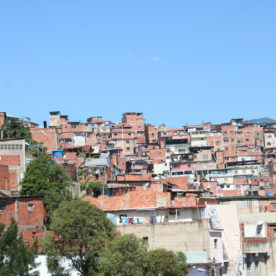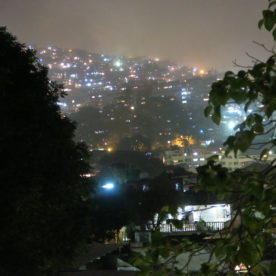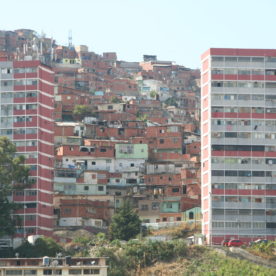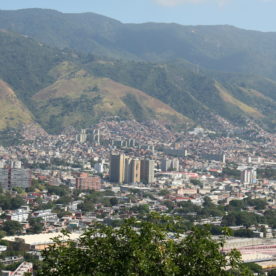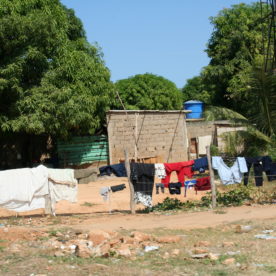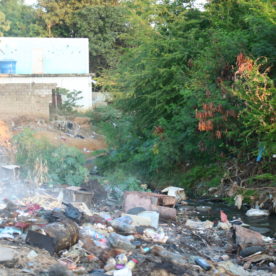In January 2019, MSC Missions Office Director Fr Michael O’Connell spent three weeks in Venezuela, visiting MSC parishes in the cities of Maracaibo and Caracas. Here, he shares his experiences and his thoughts on a country in crisis.
“Having spent time with local families in Maracaibo and Caracas, it’s clear that the new measures put in place to help the economy in Venezuela have essentially done nothing; the government have great ideas, but they just don’t happen, and many aren’t realistic. For example, the president recently announced a new law stating that nobody could be made redundant for the next two years, and during my stay, he announced a new measure to end inflation – a wage rise from 5,000 bolívars per month to 18,000 bolívars per month. Sadly, this is something that many businesses just can’t accommodate, and these are unfortunately not economically viable solutions.
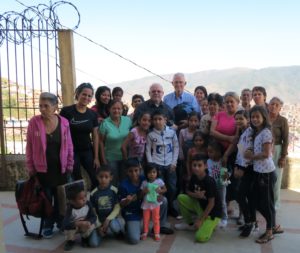
Similarly, during my stay, the government announced that they would solve the country’s milk shortage with 40 pure-bred cows that would form the basis of a new milking herd. They also recently said that they would be commencing a new scheme to make their cities beautiful. All of these fabulous plans are suggested, but at the end of the day, people are suffering terribly in reality.
The value of the bolívar changes daily and fluctuates wildly. When I arrived in Caracas on January 4th, the average monthly wage of 5,000 bolívars was worth USD $7. A week later, on January 11th, the same 5,000-bolívar wage was worth just USD $2. When you think that a loaf of bread costs around 1,200 bolívars, a kilo of cheese costs 3,000 bolívars, and 24 eggs cost 6,000 bolívars, it’s a mystery as to how people survive.
Most purchases are made by debit card. The money system changed last year, when the government took five zeros off their money and reprinted the notes as a measure to tackle inflation – now, nobody wants a 2-bolívar or a 5-bolívar note, when you think that one US dollar is worth thousands of bolívars. Everybody checks the rate of the bolívar daily – but it’s the black market rate, as the official rate means nothing to people trying their best to get by.
I might price an item one day, but the following day, the value of the bolívar has gone down and the price of the item has gone up. Because of this, many people and businesses have bank accounts abroad, particularly in the US. People depend hugely on charity from family members aboard, and money is deposited in US dollars in these accounts for them. Families are very linked up at home and abroad, and they help each other, depositing money in USD because the value of the bolívar changes so frequently.”
“Really, it’s a mystery as to how people survive from day to day.”
“People aren’t wheeling and dealing – they’re just surviving, and really, it’s a mystery as to how people survive from day to day. Families tend to live together, so they have multiple wages coming into the house. One of our students was telling me that he went home to visit his family for a few weeks last summer, but he was embarrassed to be there because he was an extra mouth to feed and he wasn’t contributing anything. He told me that his family were not poor, that they were a comfortable, middle-class family, but now, he said, ‘we are becoming poor middle-class’.
In terms of economic measures, it’s estimated that it will take Venezuela 20 years to recover from this crisis. Back in the 1990s, Venezuela was ranked around 29th in the world for its standard of living. Last year, they ranked in the mid-40s. It took them 20 years to get to that point, and now it will take another 20 years to get back to where they were. In the meantime, people are left with no real end in sight to their daily struggle for simple survival.”
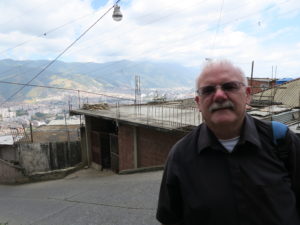
PLEASE SUPPORT OUR MSC MISSIONS
